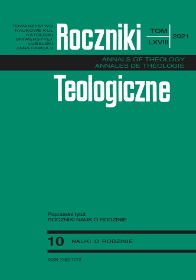The Use of New Digital Technologies by Intellectually Disabled Children in the Opinion of Their Parents
Abstract
The article presents the results of research conducted among parents of mildly intellectually disabled children. Their aim was to describe the knowledge of parents about the digital activities of their children and to characterise the activities of parents around children's use of new digital technologies. The research was carried out using the diagnostic survey method. 1295 people were involved. The research found statistically significant relationships between the frequency of using new media by parents and the frequency of using them by children. It was found that the parents first allowed their children to use computer games independently (the average age of initiation of use was 11 years), and then to use a mobile phone (the average age of initiation of use was 11 years and a half years). Then they introduced the child to the online world (the average age of initiation was 12). Additionally, statistically significant differences were found between working and non-working parents in terms of the principles of using new media applied at home. Almost 1/3 of the respondents reported Internet abuse by the child, every tenth parent pointed to the child's online contact with materials inadequate to his age, and every twentieth parent informed about the need to settle payments for applications or programs downloaded by the child from the Internet.
References
Caton, Sue, and Melanie Chapman. „The use of social media and people with intellectual disability: A systematic review and thematic analysis”. Journal of Intellectual and Developmental Disability 41(2016): 125-39.
Gałecki, Piotr, Maciej Pilecki, Joanna Rymaszewska, Agata Szulc, Sławomir Sidorowicz i Jacek Wciórka. Kryteria diagnostyczne zaburzeń psychicznych DSM-5. Wydanie piąte. Wrocław: EDRA Urban i Partner, 2018.
Jenaro, Cristina, Noelia Flores, Maribel Cruz, Ma Carmen Pérez, Vanessa Vega, and Victor Torres. „Internet and cell phone usage patterns among young adults with intellectual disabilities.” Journal of Applied Research in Intellectual Disabilities 31(2018): 259-72.
Johnson, Genevieve Marie, and Korbla Puplumpu. „Internet Use during Childhood and the Ecological Techno-Subsystem.” Canadian Journal of Learning and Technology 34(2008), https://doi.org/10.21432/T2CP4T.
Krzyżak-Szymańska, Ewa, Joanna Kowalkowska i Andrzej Szymański. Zagrożenia dzieci i młodzieży w sieci: cyberproblemy, diagnoza i profilaktyka: vademecum nauczyciela. Katowice: GWSH w Katowicach, 2016.
Normand, Claude L., and François Sallafranque-St-Louis. „Cybervictimization of Young People With an Intellectual or Developmental Disability: Risks Specific to Sexual Solicitation.” Journal of Applied Research in Intellectual Disabilities 29(2016): 99-110.
Plichta, Piotr. Socjalizacja i wychowanie dzieci i młodzieży z niepełnosprawnością intelektualną w erze cyfrowej. Toruń: Wydawnictwo Adam Marszałek, 2017.
Pyżalski, Jacek, Mariusz Przybyła i Michał Klichowski. Szanse i zagrożenia w obszarze wykorzystania technologii informacyjno-komunikacyjnych (TIK), ze szczególnym uwzględnieniem aplikacji mobilnych (TIK-mobApp) przez dzieci w wieku 3-6 lat. Poznań: Uniwersytet im. A. Mickiewicza w Poznaniu, Narodowe Centrum Badań i Rozwoju, 2014.
Pyżalski, Jacek, Aldona Zdrodowska, Łukasz Tomczyk i Katarzyna Abramczuk. Polskie badanie EU Kids Online 2018. Najważniejsze wyniki i wnioski. Poznań: Wydawnictwo Naukowe UAM, 2019.
Schalock, Robert L., Ruth Luckasson, and Marc J. Tassé. „Intellectual Disability: Definition, Diagnosis, Classification, and Systems of Supports, 12th Edition”. AAIDD, 2021, https:// www. aaidd.org/publications/bookstore-home/product-listing/intellectual-disabil ity-definition-diagnosis-classification-and-systems-of-supports-12th-edition.
Szymański, Andrzej i Ewa Krzyżak-Szymańska. „Rola rodziców w zapobieganiu nadużywania przez dzieci nowych technologii cyfrowych”, Serwis Informacyjny UZALEŻNIENIA, 3(2018): 17-21.
TNS Polska S.A. Bezpieczeństwo dzieci w internecie. Raport z badań jakościowych i ilościowych. Warszawa: Fundacja Orange, Fundacja Dzieci Niczyje, 2013, https://docpl ayer. pl/2803613-Bezpieczenstwo-dzieci-w-internecie-raport-z-badan-jakosciowych-i-iloscio wych. html.
TNS Polska S.A. Rodzice i dzieci wobec zagrożeń dzieci w Internecie. Warszawa: Fundacja Orange, 2016.
Copyright (c) 2021 Roczniki Teologiczne

This work is licensed under a Creative Commons Attribution-NonCommercial-NoDerivatives 4.0 International License.





